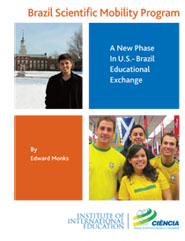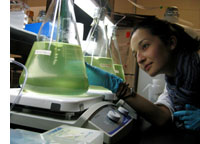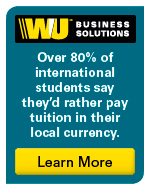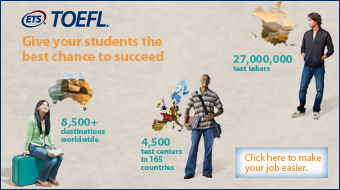
| IIE Home | Membership | Publications | Open Doors | Contact Us | Subscribe |
|
||
|
News
 Application Deadline: December 31, 2013 | Download Application Form
ConocoPhillips China (COPC) this week announced the launch of the 2013 China Environmental Stewardship (CES) Awards competition in partnership with the Institute of International Education (IIE).
Funded by COPC and administered by IIE, the CES Awards will provide financial assistance to promising graduate students and their academic advisors at Chinese universities for study, research and training in the fields of environmental protection, risk management and sustainable development. ConocoPhillips has committed USD 600,000 for the first three years of this program. Four to six multi-year awards will be offered each year. In addition to providing direct financial support for the study, research and training plans of each CES awardee, the program will also provide networking and leadership development opportunities to all program participants.
Candidates currently enrolled in graduate studies at Chinese universities who can demonstrate a keen academic interest in environmental protection, risk management or sustainable development are encouraged to submit applications by December 31, 2013. The final awards will be announced in May 2014, following a strict selection process that will include face-to-face interviews. For more information about the competition, including the fields of study covered, application requirements, evaluation criteria, and more information, please visit the China Environmental Stewardship Awards website.
 A new report from the Institute of International Education (IIE) highlights the growth of the Brazilian Government's Scientific Mobility Program in the United States. A new report from the Institute of International Education (IIE) highlights the growth of the Brazilian Government's Scientific Mobility Program in the United States. The report, "Brazil Scientific Mobility Undergraduate Program in the United States: A New Phase in U.S.-Brazil Educational Exchange" provides an overview of the Brazil Scientific Mobility Undergraduate Program and presents a snapshot of current trends and statistics, including:
The report also includes a number of appendices that list all U.S. host institutions, Brazilian sending institutions and corporate partners.
About the Brazil Scientific Mobility Program:
In July 2011, Brazilian President Dilma Rousseff announced the creation of a new scholarship program known as Ciência sem Fronteiras, a multiyear initiative to send 75,000 fully funded Brazilian students abroad for training in the science, technology, engineering, and math (STEM) fields, with an additional 25,000 scholarships expected to be funded by the private sector. This initiative is coordinated jointly by the Brazilian Ministry of Science and Technology’s National Council for Scientific and Technological Development (CNPq) and the Ministry of Education’s Federal Agency for the Support and Evaluation of Graduate Education (CAPES).
The program was created to promote scientific research, invest in and fund educational resources within Brazil and outside of the country, increase international cooperation in science and technology, and engage students in a global dialogue through international education. Scholarships are awarded for study in 30 countries. The United States currently hosts the largest number of students, followed by France, the United Kingdom, and Canada.
 Allan Goodman, IIE President, and Mark Angelson, IIE Treasurer and Scholar Rescue Fund Chairman, were recently interviewed by Richard Heffner as the featured guests for the half-hour weekly PBS television talk show, Open Mind. In the interview, Goodman and Angelson discuss the history of the Institute and the work of the IIE Scholar Rescue Fund. Allan Goodman, IIE President, and Mark Angelson, IIE Treasurer and Scholar Rescue Fund Chairman, were recently interviewed by Richard Heffner as the featured guests for the half-hour weekly PBS television talk show, Open Mind. In the interview, Goodman and Angelson discuss the history of the Institute and the work of the IIE Scholar Rescue Fund.The IIE Scholar Rescue Fund connection was especially significant for the host, because he worked with renowned broadcaster Edward R. Murrow, who was IIE’s first Assistant Director in the 1930’s.
In 1932, at age 24, Murrow was hired as Assistant Director by IIE's founder and Director, Dr. Stephen P. Duggan. Murrow's main assignment at IIE was to identify European scholars who were at risk in their home countries and arrange for them to lecture and teach at U.S. colleges and universities. This early forerunner of IIE's Scholar Rescue Fund was first called the Emergency Committee in Aid of Displaced German Scholars, and later expanded to help other "Displaced Foreign Scholars" fleeing Nazi repression throughout Europe.
Hundreds of European scholars were successfully relocated to America, including Paul Tillich, Martin Buber, Thomas Mann, Jacques Maritain, Herbert Marcuse, Felix Bloch, Kurt Lewin, Otto Nathan, and Hans Morgenthau, with support from the Rockefeller and Carnegie Foundations and generous hosting by American campuses. Murrow worked with the Emergency Committee until early 1937, overlapping the first year of his long career at CBS News.
IIE offers a variety of audience-tailored digital newsletters. The newest addition to the list is the Global Opportunities for Teachers newsletter, which contains useful resources for teachers, professional development opportunities, and stories of teachers doing exciting global things. Last week’s edition featured quotes from alumni of IIE’s teacher exchange program on international education and how they plan to celebrate International Education Week in their classrooms. It also included announcements about training and professional development opportunities for teachers and international activities for students.
IIE President Allan Goodman writes in a recent blog post about his participation as a keynote speaker at the China Annual Conference for International Education in Beijing. "In welcoming us, the conference host mentioned his visit to the Institute’s headquarters in September. He told the audience that...’Opening Minds to the World’ was what his and our organizations were all about." The chairman of the China Public Diplomacy Association later said, "Opening minds is the best investment any country can make to world peace."
Rahul Choudaha argues in an article published in University World News that U.S. higher education institutions are in need of diversification in their internationalisation strategies. His analysis is based on three trends recently published in IIE’s 2013 Open Doors report. While all three trends indicate growth in international student enrolment, institutions met demand for this growth by enrolling primarily bachelor-level students from two countries: China and Saudi Arabia.
Dorothea Rüland from the German Academic Exchange Service (DAAD) sees the university as one of the core institutions in national development. In this article, published in University World News, Rüland calls for collaboration and commitment to enhance research activity in African universities. "Demand for quality higher education provision is exploding. Underfunding, however, has left many African universities with inadequate infrastructure and some of their best talent working overseas," writes Rüland.
Conferences
March 30 - April 1, 2014 | San Diego, CA
Early bird registration deadline: January 31, 2014 | Register now for discounted rates Hosted by the University of San Diego, this year's Diversity Abroad Conference will provide professionals with the opportunity to engage in thought-provoking exchanges of ideas and approaches to diversifying the types of students involved in education abroad.
Five Pre-Conference Workshops have been added to the schedule this year to provide more opportunities for conference goers to gain valuable knowledge from experts in the field. Workshops have limited space and will be filled on a first come first served basis.
For more information, contact Lily Lopez-McGee at lmcgee@diversityabroad.org or 510.982.0635 ext. 702.
June 10-13, 2014 | Toronto, Canada
Proposal Deadline: February 3, 2014 | Submit Online The Global Internship Conference (GIC) is a forum dedicated to advancing the knowledge of academic work placement and experiential education. At this time proposals are welcome for those wishing to present at the 2014 GIC.
The scope of this conference includes, but is not limited to, professionals and researchers who work in the field or seek to learn more about internships, academic work placement, co-operative education, teaching, and volunteering. As a platform for dialogue, and vehicle for action, the Global Internship Conference brings together colleagues to discuss and advance best practices as well as develop and examine a research agenda for global internships. The 2014 conference will be held in Canada, a country with a long-standing history of, and significant contributions in, co-op education with work placements designed into the curriculum. The theme of this year’s conference is "Internships, Co-op, Experiential Education – Where Next?"
Your session proposals should address a wide range of topics, particularly presentations that leverage a comparative approach from a national perspective that draw on the Canadian sector’s experience. Additionally, proposals should explore one or more of the possible theme and topics below:
Research: Presentations are informed by the literature and/or offer original recent results demonstrated by analysis, theoretical development, or experimentation. Examples include dissemination of employer perception studies, application of student development theories, or analysis of learning outcomes.
Best Practices: Presentations demonstrate elements of comprehensive experiential education programs and assess examples of best practices in action. Examples include risk management, academic integration, employer development, or placement evaluation.
Country/Region: Presentations examine unique elements of a country or region. Examples include employer expectations, visa paperwork, cultural preparation, industry areas, or expanding to under-served areas.
Special Topics: Presentations explore current issues or trends in academic work placement and experiential education. Examples include exploring virtual internships, developing multi-disciplinary program standards, working with nursing students, or incorporating social networks into experiential education.
Register for the conference by February 3, 2014 at globalinternshipconference.com.
Deadlines
Application Deadline: December 4, 2013 | Download Nomination Form
IIE is issuing a call for nominations from U.S. colleges and universities that currently have students from the Philippines enrolled on their campuses who have emergency needs for funds due to of the financial situation in their home country caused by typhoon Haiyan. Philippines-ESF will provide grants of $3,000 each to selected Filipino students nominated by their U.S. host colleges and universities. Priority will be given to undergraduates and to those with the most urgent financial need and those closest to graduation.
Allan E. Goodman, president and CEO of the IIE, said, "Our goal is to help relieve the financial burden that is compounding these students' personal distress, and to encourage them to complete their U.S. studies so they can return home with the skills and new knowledge to help rebuild their shattered communities."
International Student Advisers or other campus officials should complete the Philippines-ESF nomination form and e-mail it to esf@iie.org by December 4, 2013. Awards will be announced in mid-December. Applications directly from students will NOT be accepted. U.S. host campuses nominating students for Philippines-ESF awards are expected to provide some emergency assistance to the nominated students, through tuition waivers, full or partial scholarships, housing, stipends, loans, work study, or other forms of support.
IIE’s Emergency Student Fund provides grants to post-secondary students matriculated at accredited educational institutions outside their home countries whose sources of support have been impacted by natural disaster or other crises. Since 2010, IIE’s ESF has provided over $1 million to more than 400 students from Syria, Iran, Japan, Haiti, Libya, and Thailand whose home sources of financial support were impacted by crisis or natural disaster.
Application Deadline: January 31, 2014 | Apply Online
The Japan-IMF Scholarship Program for Advanced Studies (JISP) is a two-year program intended to provide assistance to Japanese nationals obtaining Ph.D. degrees in macroeconomics at universities outside of Japan and to prepare them to work as economists at the International Monetary Fund (IMF). The scholarship is funded by the government of Japan and administered by the IMF Institute with assistance from the Institute of International Education (IIE).
Awards are available to candidates able to obtain a Ph.D. by age 34 and who will be entering the 1st, 2nd, or 3rd year of their Ph.D. program.
Up to seven scholarships are awarded annually on a competitive basis to students with a record of high academic achievement. All JISP scholars are required to apply to the IMF’s Economist Program (EP) upon completion of their doctoral studies and to accept an EP position if offered.
For inquiries about submitting applications, general questions, and any other information, please contact japanimfscholarship@iie.org.
Applicant profile: Universities or research institutions, U.S. or worldwide
Applications due: December 10, 2013 at 11:59 PM EST
Grant size: $50,000
Grant length: 8 months
Research Products:
IIE’s USAID-funded Democracy Fellows and Grants (DFG) Program is pleased to announce the release of a new grant solicitation to support USAID’s understanding of social movements, with the goal of determining how USAID can identify, understand, and support the informal networks, systems, and leadership that have characterized the social movements of the Arab Spring.
The successful applicant will receive an eight-month, $50,000 grant to draft a case study review of social movements in the Middle East and North Africa region, present the case study at a workshop for peer review and for USAID’s Center of Excellence for Democracy, Human Rights, and Governance (DRG Center), and finalize the document based on feedback. The full request for applications (RFA) and all application instructions are available on the DFG website. Applications are due on December 10, 2013 at 11:59 PM EST. Any questions on the RFA should be emailed to dem.grants@iie.org; answers will be posted, without attribution, on the DFG website.
IIE’s DFG grant program is designed to strengthen the DRG Center’s work by integrating the knowledge and skills of the academic community. IIE will publish several research grant opportunities during the five years of the DFG program (September 2012 – September 2017). Interested scholars are encouraged to join the DFG Mailing List to receive email alerts when new grant opportunities are published.
Partnerships
 Proposal Deadline: December 16, 2013 | Read More and Apply
The governments of the United States and the United Kingdom have recently launched the Global Innovation Initiative, a new higher education grant competition created to strengthen higher education research partnerships between the United States, the United Kingdom and four other countries: Brazil, China, India, and Indonesia. This initiative will provide exciting grant opportunities for post-secondary educational partnerships on topics of global significance in the following four science, technology, engineering, and mathematics (STEM)-related areas: energy, climate change, and the environment; agriculture, food security, and water; public health and wellbeing; and urbanization.
Accredited U.S. post-secondary educational institutions are invited to apply for one of approximately ten grants of up to $250,000 each, and must apply together with at least one higher education partner in the UK, and one in Brazil, China, India, and/or Indonesia. Grant recipients will be announced in spring 2014.
For more information please contact GII@iie.org.
Study Abroad
Stacie Berdan’s latest article in The Huffington Post discusses the important role of student exchanges in building greater ties between the United States and other nations. "[U.S. students] will need to understand the cultural differences and historical experiences that divide us, as well as the common values and humanity that unite us" says Berdan, co-author of A Student Guide to Study Abroad. Recent data released in IIE’s 2013 Open Doors shows positive growth in student mobility, particularly between China and the Unites States, which Berdan argues "should result in greater U.S.-China cooperation in business, government and other sectors; help keep open channels of communication; and strengthen global stability."
The Benjamin A. Gilman International Scholarship Program is pleased to announce the spring 2014 awards offered. Eighty selection panelists from various colleges and universities across the nation met at the IIE office in Houston, Texas to review over 2,600 applications. Over 700 outstanding students were selected to receive the scholarship to attend study abroad programs and international internships for academic credit in locations all around the world.
The Gilman International Scholarship Program is a congressionally funded program sponsored by the Bureau of Educational and Cultural Affairs (ECA) at the U.S. Department of State and is administered by the Institute of International Education (IIE) through IIE’s office in Houston, Texas. The Gilman Scholarship Program offers U.S. undergraduate students of high financial need grants of up to $5,000 to participate in a study abroad program or international internships eligible for academic credit. Students studying a critical need language could be eligible to receive a grant of up to $8,000. The Gilman Program aims to diversify the kinds of students who study and intern abroad and the countries and regions where they go by supporting U.S. undergraduates who might otherwise not consider these unique and developmental opportunities due to financial constraints.
|
| www.iie.org/iienetwork • Member website of the Institute of International Education © 2025 Institute of International Education. All rights reserved. |



